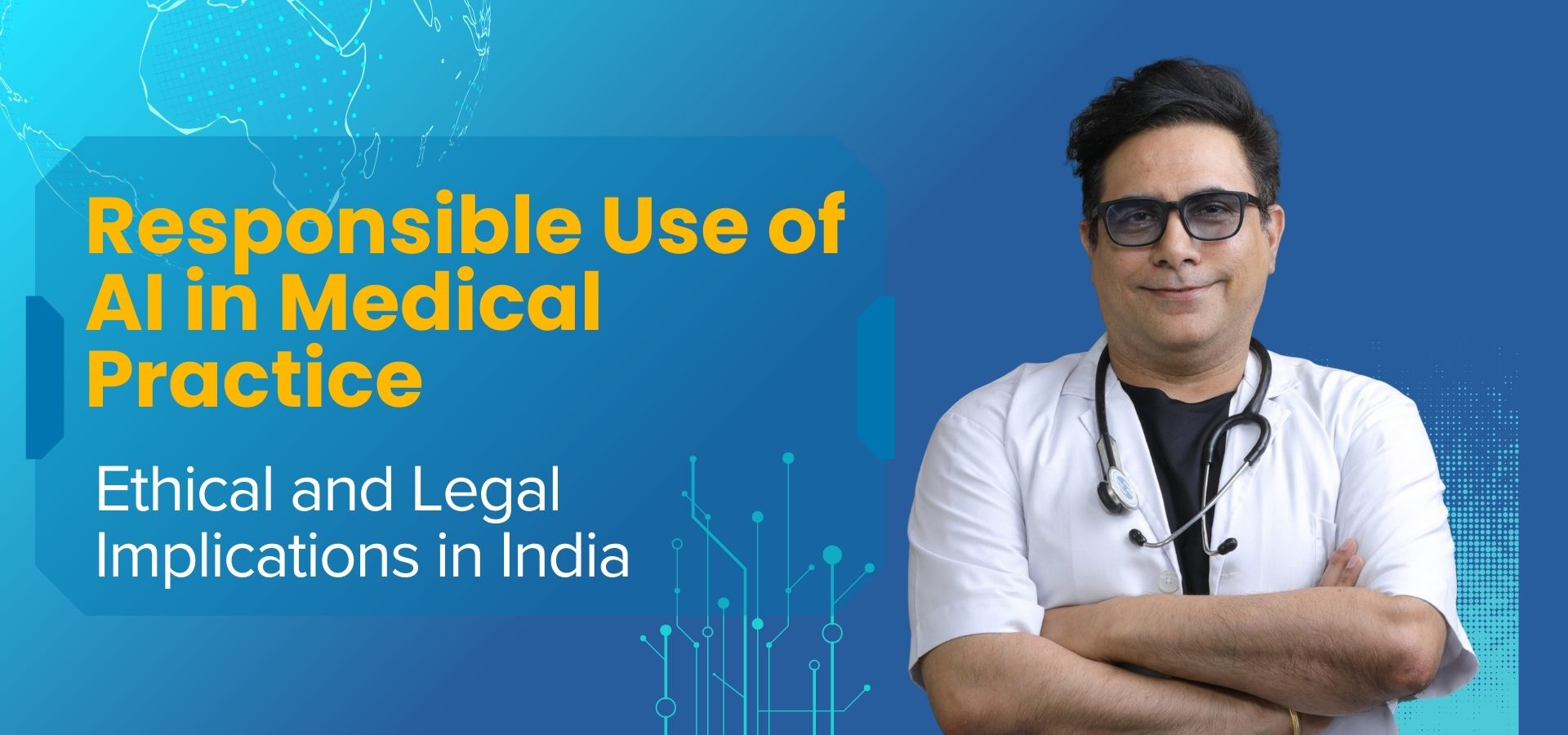Introduction
The dawn of Artificial Intelligence (AI) in Indian medical practice marks a seismic shift in how healthcare is delivered. From algorithm-driven diagnostics to virtual health assistants, AI is not just a futuristic concept—it is reshaping Indian clinics and hospitals as we speak. However, with power comes responsibility. As clinicians, we must become stewards of this technology, ensuring the responsible use of AI in medical practice aligns with both ethical values and legal mandates.
Doctors and healthcare professionals in India can no longer afford to be unaware of the frameworks that govern this technology. In an era of rapid innovation, understanding the ethical and legal implications of AI in healthcare is not a luxury, but an absolute necessity.
1. The Rise of AI in Indian Medical Practice
The integration of AI in Indian medical practice is fast gaining momentum. Today, AI is transforming:
- Diagnostics: Algorithms analyze X-rays, MRIs, and even skin lesions with clinical accuracy rivaling human experts.
- Predictive Analytics: AI tools forecast patient outcomes, detect potential complications, and aid preventive care, especially for chronic diseases.
- Virtual Health Assistants: Chatbots and automated triage systems are already serving millions, improving access and patient flow.
Institutions like Apollo Hospitals and Narayana Health have deployed AI-driven systems for early cancer detection, cardiac risk assessment, and more. The appeal is clear: These smart solutions promise to make healthcare delivery more efficient, accurate, and cost-effective. For a country as diverse and populous as India, AI holds the key to bridging critical gaps in healthcare accessibility.
2. Ethical Considerations in AI-Powered Healthcare
While the advance of AI brings promise, it raises complex ethical implications of AI in healthcare that demand our attention:
Patient Autonomy & Informed Consent
It is imperative that every patient is aware when an AI tool is in the loop for diagnosis or treatment. True informed consent means disclosing AI’s role in clinical decision-making. Unfortunately, patients are often not told—undermining their autonomy.
Bias & Fairness
AI systems reflect the data sets used to train them. If those datasets are biased, the algorithms reinforce health disparities—misdiagnosing darker skin tones, underrepresenting minorities, or missing context-relevant factors in Indian patients. Unless proactively corrected, AI risks amplifying inequalities rather than solving them.
Transparency & Explainability
AI often operates as a “black box”—producing results with reasoning that neither the doctor nor the patient can understand. Are we prepared to explain to a patient why an algorithm flagged a tumor or rejected a treatment? Transparency is crucial for trust and accountability.
Professional Accountability
The responsible use of AI in medicine hinges on clear accountability. As clinicians, can we entrust AI with life-altering decisions? Remember: Ultimate responsibility for patient outcomes must remain with the human doctor, regardless of the technology’s sophistication.
3. Legal Implications of Using AI in Medical Practice in India
As Indian hospitals adopt AI, legal challenges emerge:
Who Is Liable for Errors?
If an AI system misdiagnoses a condition or recommends a harmful treatment, who is legally responsible? The practitioner, the hospital, the AI developer, or the device manufacturer? These questions still lack definitive answers in Indian law.
Can AI Be a ‘Medical Actor’ Under the Law?
Currently, Indian statutes do not recognize AI as a legal entity or ‘medical actor’. This means the burden of compliance and legal responsibility falls squarely on the healthcare professional using the AI—but not on the technology itself.
Relevant Regulations and Acts
- Consumer Protection Act, 2019: Holds healthcare providers accountable for “deficiency in service”—including errors mediated by technology. Doctors may be liable even when AI is involved.
- Information Technology Act, 2000 (IT Act): Governs data privacy and security, critical where AI uses or shares sensitive health information.
- National Medical Commission Regulations (formerly Medical Council of India Code of Ethics): Prescribes professional standards but currently lacks explicit guidelines on AI.
- Telemedicine Practice Guidelines: Allows remote AI-assisted consultations but mandates full doctor oversight.
Despite broad regulatory frameworks, there is no India-specific law directly addressing the legal implications of AI in Indian healthcare. This leaves a significant vacuum and exposes doctors to uncertain risks and potential litigation.
4. Data Privacy and the Digital Health Ecosystem
The proliferation of AI in medicine depends on massive personal health data. This brings:
Patient Records, Ownership & Misuse
Electronic Health Records (EHRs) and AI-powered platforms collect, process, and sometimes share vast amounts of patient data. Who owns this data? How can doctors prevent misuse by third-party vendors?
Digital Personal Data Protection Act, 2023
This new law classifies hospitals and doctors as “data fiduciaries.” The law mandates:
- Explicit patient consent for data use—including for training AI models.
- Stringent data security provisions.
- Severe penalties for breaches, leaks, or misuse.
Risks and Responsibilities
Data anonymization, robust cybersecurity, and compliance training are now non-negotiable. The risk of privacy violations is significant—and non-compliance can result in fines or criminal charges. Thus, the responsible use of AI in Indian medical practice must prioritize patient privacy at every level.
5. Global Case Studies and Legal Precedents
Globally, AI-related malpractice cases have already begun—for example:
- In the US, an AI tool misread mammograms, leading to missed cancer diagnoses, triggering lawsuits.
- In the UK, the NHS faced scrutiny over AI tools used without sufficient patient transparency or GDPR compliance.
In contrast, India lacks clear judicial precedents on AI-related medical errors or negligence. This ambiguity means Indian healthcare professionals need to be doubly vigilant, adopting best practices even in the absence of explicit legal guidelines. Proactive compliance is a must for minimizing risk.
6. The Need for Training & Regulation
For Indian healthcare to embrace AI safely, doctors must receive specialized training in:
- Medical law: Understanding the legal landscape and one’s liabilities when using AI.
- AI ethics: Recognizing, anticipating, and mitigating ethical pitfalls in real-time.
It is now essential that Medical Colleges and Professional Associations mainstream AI modules within the medical law and ethics course India offers. Ongoing education is the only way to keep pace with rapid technological—and regulatory—change.
Conclusion & Call to Action
AI holds immense promise to revolutionize Indian healthcare. But with this power comes the undeniable responsibility to wield it ethically and within well-understood legal boundaries. As medical professionals, we cannot afford to be passive observers—our duty is to stay informed, vigilant, and proactive.
If you are a healthcare professional in India, don’t wait for regulations to catch up. Equip yourself with the knowledge to harness technology safely and compliantly. Enroll in Dr. Arvinder Singh’s Medical Law and Ethics Course today—future-proof your clinical practice, and lead the way for responsible use of AI in medicine.


